“Evil committed for a good cause remains evil.”
“Even when it succeeds?”
“Above all when it succeeds.”
~Victor Hugo, History of a Crime (1877)1
An advance medical directive (AMD) is a legal document that allows a person to specify the medical treatment he wants and does not want in case he becomes incapable of making his desires known.
AMDs generally have four parts:
- Naming another person to act as your health care agent in the event you are incapacitated
- Detailed instructions on what types of health care you do and do not want
- Preferences regarding organ and tissue donation
- Your witnessed signature
There are three general classes of AMDs: the living will, the standard durable power of attorney for health care (DPAHC or DPA), and hybrid documents that combine elements of both the living will and the DPA.
The Catholic Church has stated in many documents (including the Charter for Health Care Workers), that the right to make medical decisions belongs properly to the patient. This principle is based upon each person’s dignity and right to self-determination. Human freedom has always been extolled by the Church, and this doctrine is equally applied to the right of individual persons to make decisions about their own treatment. Furthermore, the Church teaches that human life is a great gift from God, and that each person is a steward of this gift. The Church provides specific guidelines on which means to preserve life may be accepted or rejected.
AMDs and those surrogates who speak for patients in terms consistent with Church moral teachings are themselves morally good. However, Catholics who choose to use AMDs should be careful that any decisions made in their behalf at the end of their lives will be pro-life ones.
The Living Will
The oldest and most extensively used type of AMD is the “living will.” It instructs attending medical personnel about the patient’s wishes regarding their treatment if they become incapable of speaking for themselves and making their own medical decisions.
Each state, including Puerto Rico and the District of Columbia, has its own law governing its living will and indicates when it becomes activated. For example, in many states, the living will comes into force when the patient has developed a “terminal condition” (often meaning that physician(s) determine the patient has less than 6 months to live), and that the patient is no longer able to speak for himself.
A living will allows a patient to appoint a surrogate, known as a “power of attorney” (POA), who is empowered to speak on behalf of the patient. The POA is needed in order to address the inherent limitations of living wills. The patient, when he executes a living will, is not able to predict every circumstance or treatment decision they and their physician may ultimately encounter. Therefore, the patient’s spokesperson is able to make decisions about medical treatment that addresses unforeseen circumstances the patient encounters.
Neither a POA nor a DPA needs to actually be an attorney. However, it important to note that POAs function differently than durable powers of attorney (DPAs). POAs and DPAs both can operate broadly, depending on the powers granted to them. But the powers of a POA are relinquished once the client becomes incapacitated or dies, or when the actions are completed that the POA was appointed for. A DPA still holds power when the client is incapacitated. Thus, a DPA can advocate for clients who could otherwise not advocate for themselves. A DPA’s power is only relinquished upon the death of the client.
Writing Catholic Living Wills
The living will and its accompanying POA are important mechanisms for safeguarding the rights of patients who have lost the ability to make treatment decisions regarding their own medical care. All Catholics should contemplate the principles of virtuous dying and should learn about the Church’s teaching concerning medical care – in particular the means used to preserve their own lives.
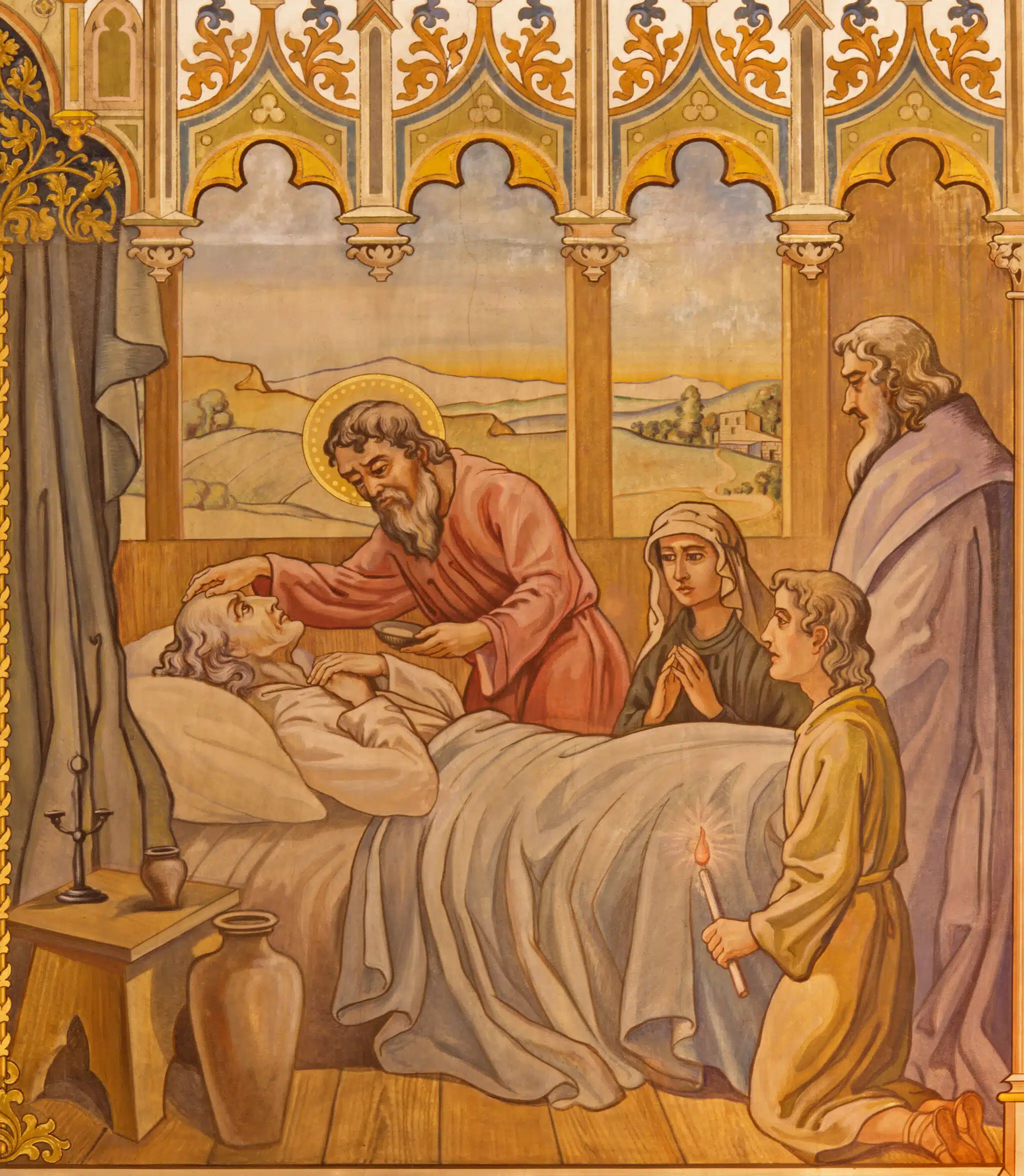
The neo-gothic fresco of the scene the Apostles at Viaticum by Leopold Bruckner (1905 – 1906) in Saint Nicholas church
There are several things to include in one’s living will, including:
- the desire for pain relief
- assessing whether a treatment is ordinary or extraordinary (described below and in DNR section)
- providing nutrition and hydration
- prohibiting euthanasia
- providing for spiritual care (discussed in spiritual needs section). (To read more about each of these items, see here.)
The Catechism teaches that it is morally licit to discontinue medical means to preserve life that are burdensome or disproportionate to the expected outcome (extraordinary means), calling such a decision a “refusal of ‘over-zealous’ treatment.” In contrast to this virtuous act, there are concerns about patients being abused in a culture steeped in utilitarianism and death. Such a culture devalues life and human dignity and must be identified and opposed when threats to humanity are encountered.
For this reason, not just any living will is acceptable to Catholics. Most versions of the living will were originally written and promoted by pro-euthanasia organizations, including:
- Americans Against Human Suffering (AAHS)
- The American Civil Liberties Union (ACLU)
- Concern [Compassion] for Dying, formerly the Euthanasia Educational Council
- The Hemlock Society, which has renamed itself “Compassion and Choices”
- The Society for the Right to Die, which shed its nonprogressive title “Euthanasia Society of America” in 1975
The primary strategic objectives of some promoters of the living will were cost containment and the conditioning of the public to accept the withdrawal of lifesaving treatment.
Notice that none of these organizations currently uses the term “euthanasia” in their titles (they prefer the euphemisms “right to die,” “death with dignity,” and “mercy killing”). These groups operate in all states where there is an opportunity to motivate people to pressure their legislators into passing laws permitting its citizens to kill themselves.
Spokesmen for these groups have said that the living will is a publicly acceptable way to introduce legalized active euthanasia, suicide and assisted suicide to the public. For example, Derek Humphry, founder of the Hemlock Society which is now called “Compassion and Choices,” acknowledged, “We have to go stage by stage, with the Living Will, with the power of attorney, with the withdrawal of this; we have to go stage by stage. Your side would call that the ‘slippery slope.'”2
Most living wills signed in the United States today are form type wills, but as with any legal document, they can be custom-tailored to meet any actual or perceived need or wish, including requesting or refusing feeding tubes, antibiotics, dialysis, respirators, cardiopulmonary resuscitation (CPR) and other specified treatments; requesting pain medication; stating the desired place of death, including at home; and requesting designation as an organ donor.
Catholics who use living wills and durable POAs should write these documents and instruct their surrogates that all medical treatment and withdrawal decisions are to be made consistent with the Church’s moral teaching. Due to various limitations of living wills, many Catholic ethicists believe that the most important advance directive is to give POA to a Catholic who is very familiar with both the teachings of the Church regarding medical care and with the patient and his values. In many states, the Catholic Bishops’ Conference publishes their own Catholic living will which respects Catholic teaching. For an example, see the Pennsylvania Catholic Bishops’ Conference living will.
We have seen that there are many problems associated with the standard living will, although these are not insurmountable with the assistance of a qualified attorney. Fortunately, there are alternatives to the living will that allow a person to transfer his medical decision-making to another who shares his values regarding human life, thus giving him a much larger degree of protection. There are also certain types of alternative AMDs that should be avoided.
Alternatives to the Living Will
There are many different types of AMDs besides the living will, which is currently the most popular version. Unlike most living wills, these durable powers of attorney (DPAs) or hybrid documents do not require that the signer suffer from a terminal condition.
A person signing a DPA should take great care that his surrogate or proxy shares his values regarding human life and end-of-life issues. Catholics should ask those individuals who know and respect the Church’s teachings regarding end-of-life care to be their surrogate decision-maker. These surrogates should also know them and their values well enough to competently represent them. After all, the signer is giving the proxy great power to determine what treatments will and will not be provided in the case that the signer becomes unconscious or incapacitated.
The POLST (or MOLST)
One type of medical directive is the POLST (Physician Orders for Life-Sustaining Treatment), which is not an advance directive. (POLST is also referred to as MOLST – Medical Orders for Life-Sustaining Treatment in some states.) It is an actual order that empowers the attending health care professional to do exactly what is written on the document. This means that if the patient or his surrogate wrote a POLST indicating a desire for the cessation of various treatments (nutrition, hydration, antibiotics and resuscitation) under certain specified conditions and signed this document, it would be obeyed by the physician to whom it is presented.
For example, if the patient is transferred from his own home or from a nursing home to a hospital emergency department for an acute medical problem, the ER physician will follow these orders exactly, without first discussing them with family members or surrogates. The POLST was initially proposed for patients who are likely to die within one year. But many nursing homes require POLSTs to be filled out upon admission, even if the patient is not likely to die within a year.
This highlights an important practical and moral problem with POLSTs. To make informed moral decisions, the health circumstances of the patient are an important factor in determining whether the medical decisions made are good or evil. Patients who are not imminently dying are not usually in a position to make an informed and moral decision as to what means to preserve their lives are ordinary (morally obligatory) or extraordinary (morally optional). POLSTs are legally optional, and nursing facilities cannot force anyone to fill one out, nor can they threaten a patient with denying admission to their facility if they do not have a POLST.
In addition to patients not knowing the full medical circumstances that they are being forced to make decisions about, there are other problems associated with POLSTs:
- They may favor the option of non-treatment.
- They compel medical professionals to follow them since they are legally binding physician’s orders, even over the objections of proxies.
- In some states, the signature of the patient or his proxy is not required, leading to the possibility of the form being placed in the patient’s medical record without his knowledge or consent.
- Finally, in certain cases, medical professionals can use POLSTs to manipulate patients, leading them to be euthanized.3
Additionally, several studies of thousands of patients have shown that POLSTs do not improve quality of care and do not extend the life spans of those who signed them.4
Durable Powers of Attorney (DPAs)
It is essential to understand what durable powers of attorney (DPAs) and health care proxies (HCPs) are and how they function.
DPAs are referred to as HCPs in some states. They essentially function the same, with one significant difference. HCPs can only make healthcare decisions, whereas DPAs may also have the right to make decisions on your behalf regarding other areas, such as financial assets. It is paramount to understand this difference and to know what powers you are granting to your DPA or HCP so that you can make the best choices regarding your assets and health.
You may also be able to have a combination of the two. If you’d rather have two separate people make these decisions, you could have an HCP that only covers medical and healthcare decisions and a DPA who covers decisions regarding your finances, etc.
A DPA simply transfers the responsibility for making healthcare decisions from the patient to another person when the patient becomes unable to make his own decisions. A DPA allows the appointed person to become the patient’s “attorney in fact.” Ideally, this person will be someone who knows the Church’s teachings and shares the patient’s values regarding the sanctity of human life.
The designated person need not be an actual attorney or health care worker – he or she may be a spouse, relative, priest, rabbi or minister, or fellow churchgoer.
A person who selects another to be the executor of a DPA should be certain that he has thoroughly discussed his wishes with the executor regarding medical care should he become incapacitated (these instructions should be detailed enough so that the person executing the DPA can infer decisions regarding medical treatments that are not specifically discussed), and that the executor will be available and capable of making proper decisions under stress.
A DPA is very much preferable to a living will as a Catholic advance directive option. A living will is a static document that simply cannot cover all possible contingencies, and it may be interpreted incorrectly by someone who does not share the patient’s values regarding the dignity of human life. However, a DPA is able to respond to potentially complex or nuanced situations in your best interest, relying on their knowledge of your values and wishes to guide their decision-making.
If a person does not have an appointed DPA, typically the probate court will become involved and will appoint a conservator to take over the duties of a DPA. Family can request a specific person to be the DPA, but there’s no guarantee the court will approve that. Thus, it is best to have a specific plan in place beforehand.
Pro-Life DPAs
Some pro-life groups have drawn up model DPAs that serve as pro-life alternatives to the living will.
These pro-life durable POAs do several things:
- They define euthanasia precisely and explicitly prohibit it.
- They define nutrition and hydration as basic treatment and allow a person to specify those medical treatments that he would want withheld or withdrawn under certain circumstances.
- They specify that attending health care workers must do what they can to preserve the person’s life “without discrimination based on age or physical or mental disability of the ‘quality’ of life,” and prohibit “any action or omission that is intended to cause or hasten death.”
The pro-life DPA is a realistic and protective alternative for a person who rejects the utilitarianism of the living will and who does not want to place the burden of life-or-death decisions on a loved one or friend.
There are currently several explicitly pro-life AMDs. The following groups provide detailed information on end-of-life decisions and all aspects of euthanasia and physician-assisted suicide from a pro-life perspective:
- A Protective Medical Decisions Document (PMDD) may be obtained from the Patients Rights Council (PRC, formerly the International Anti-Euthanasia Task Force).
- A “Will to Live” may be obtained from the Will to Live Project, a project of the National Right to Life Committee.
- The Pro-Life Committee of the United States Conference of Catholic Bishops has published a pamphlet entitled “Advance Medical Directives: Planning for Your Future,” which provides general guidelines for those considering such documents.
Keep in mind that any competent attorney can draw up a custom-tailored, pro-life DPA if you request him to do so. First, make certain that he is a lawyer who values human life as God intended. If he does not have a lot of experience with DPAs, he may want to order a copy of one of the above documents as a starting point and modify it from there according to your wishes.
What About “Do Not Resuscitate” (DNR) Orders?
A DNR is an order to medical staff to not attempt to resuscitate a patient (by performing CPR) if they stop breathing or if the heart stops. Typically, resuscitating a person who has stopped breathing or has no cardiac activity is considered an “ordinary” or (proportionate) means to care for someone. And Catholics are bound to use ordinary means to save someone, whereas extraordinary care is not required. According to the Ethical and Religious Directives for Catholic Health Care Services #56-7:
A person has a moral obligation to use ordinary or proportionate means of preserving his or her life. Proportionate means are those that in the judgment of the patient offer a reasonable hope of benefit and do not entail an excessive burden or impose excessive expense on the family or community.
A person may forgo extraordinary or disproportionate means of preserving life. Disproportionate means are those that in the patient’s judgment do not offer a reasonable hope of benefit or entail an excessive burden, or impose excessive expense on the family or the community.
Thus, in normal circumstances, resuscitating a person is a proportionate or ordinary means to preserve someone’s life. But the Church recognizes that healthcare is not black and white. There are circumstances where resuscitating a person may no longer be an ordinary or proportionate means, but rather “extraordinary” or disproportionate. Deciding whether a DNR is morally licit – or whether any type of care is ordinary or extraordinary – in a given situation requires careful and prudent consideration, and perhaps consultation with a priest well-versed in Catholic teachings on end-of-life care.
As the National Catholic Bioethics Center points out:
I would hasten to add a few caveats, however, that are extremely important. First, the ordinary position is that persons should receive medical resuscitation if they collapse or go into cardiac arrest. The presumption is that attempting to save a person’s life is the right decision in most cases. Second, resuscitation is ordinary care unless prudent discernment has determined that it is not the best ethical choice in a specific case.
There is a worrying trend to put DNRs in place quickly and without seeking sufficient informed consent from individuals or their medical proxies if they are incapable of giving consent. Some institutions and medical professionals seek to obtain DNRs for a variety of non-ethical reasons. One of the most basic ones is economic cost reduction. It is undoubtedly cheaper to allow a patient to die rather than to resuscitate him or her and have them go on living in a hospital bed. I believe this is increasingly a driving force in some medical decision-making. Also, a consequence of the very prominent culture of death in our world is the view that many persons have “lives not worth living” who should have their deaths hastened in a variety of ways. Our current cultural context points to the need to exercise a great deal of caution before making a DNR decision.
[…] What is most relevant is the objective situation of the patient, and if he or she is at the point where the burdens of resuscitation clearly outweigh the benefit of extending life. There is a clear difference, for example, between a vigorous young person who could easily recover from the resuscitation process and someone who is very elderly and fragile. One must never lose sight of the objective duty we have to preserve life, while balancing this moral obligation with the understanding that allowing a person to die is not the same thing as killing them if the burdens of keeping them alive become excessive.
How to Ensure Spiritual Needs are Met
The priest should be called as soon as the patient is seriously ill (or scheduled for a serious or risky surgery), especially if it is a terminal or chronic illness and the patient is elderly. Ideally, the patient would still be conscious and able to make a good confession.
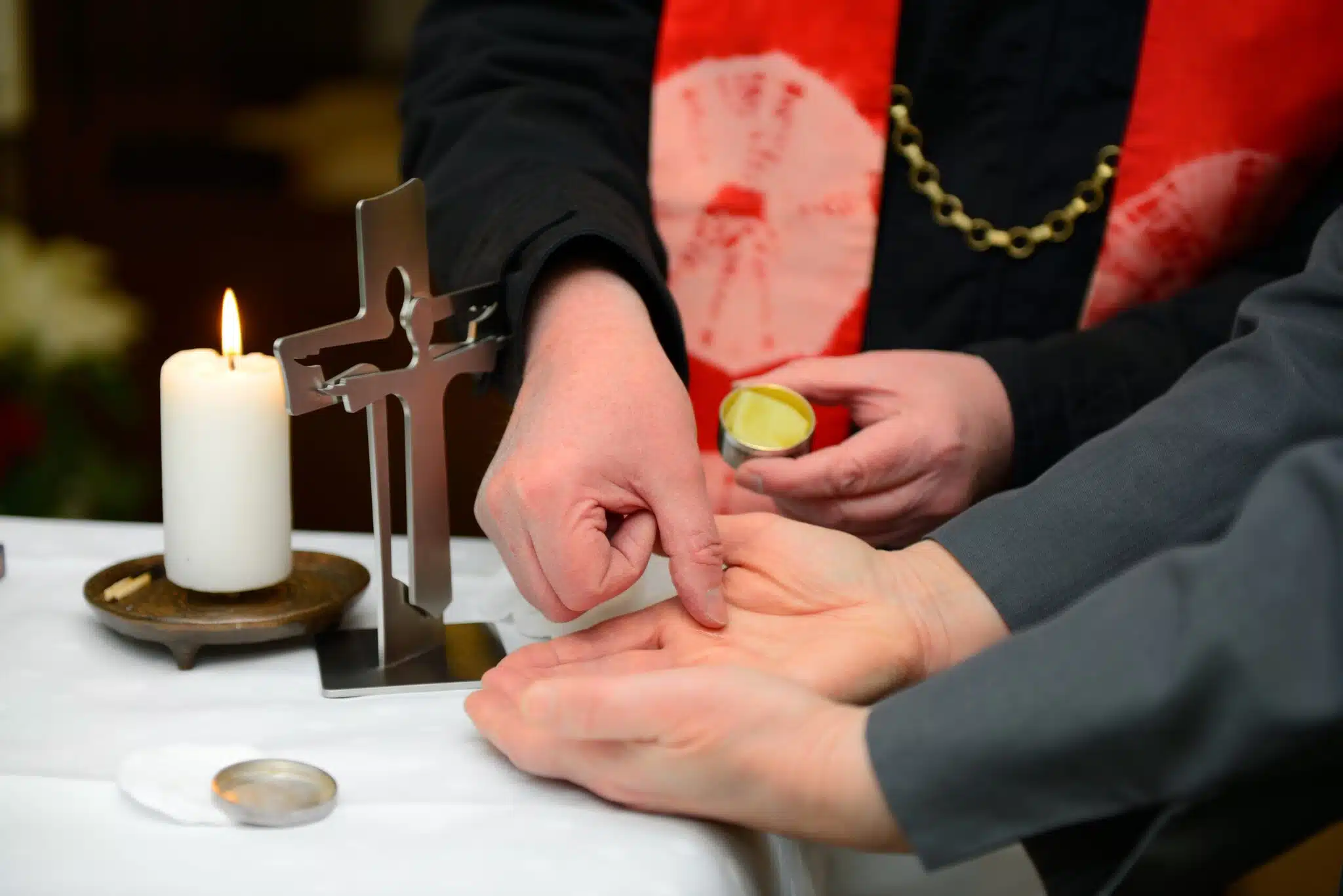
Priest performing Anointing of the Sick (Extreme Unction)
However, an unconscious patient is no reason to delay calling the priest, and he should come as soon as possible. In any case, it is also beneficial to instruct one’s DPA to ensure that a priest is present at the time of death. It is particularly helpful if one’s DPA is Catholic. One may also be able to include one’s wishes for a priest to be present to administer Extreme Unction in one’s will.
Final Thoughts on Catholic Advance Directive Options
The choices involved in end-of-life decisions can be overwhelming, and particularly concerning for the Catholic patient determined to live the end of his life ethically. An advance medical directive, especially a pro-life durable POA, can protect concerned Catholics from euthanasia or objectionable treatments.
HLI cannot give legal advice. The information in this article is intended to give you information regarding your end-of-life options as a Catholic. If you have any questions or concerns regarding this topic, please speak with a pro-life attorney who has experience in the field of wills, trusts and estate planning.
This article was originally published in July 2020 by Dr. Brian Clowes and was most recently updated in January 2024 by Marisa Cantu.
+ Endnotes
[1] Victor Hugo, History of a Crime (1877). Quoted in ALL about Issues, June-July 1990, page 38.
[2] Derek Humphry, founder of the Hemlock Society, quoted in Leslie Bond. “Hemlock Society Forms New Organization to Push Assisted Suicide Initiative.” National Right to Life News, December 18, 1986, pages 1 and 10.
[3] Father Tadeusz Pacholczyk of the National Catholic Bioethics Center, Boston Pilot, September 12, 2014.
[4] Steven Pace, M.D. “Critique of the Washington State POLST.” Ethics & Medics (National Catholic Bioethics Center), September 2016, pages 2 to 4.


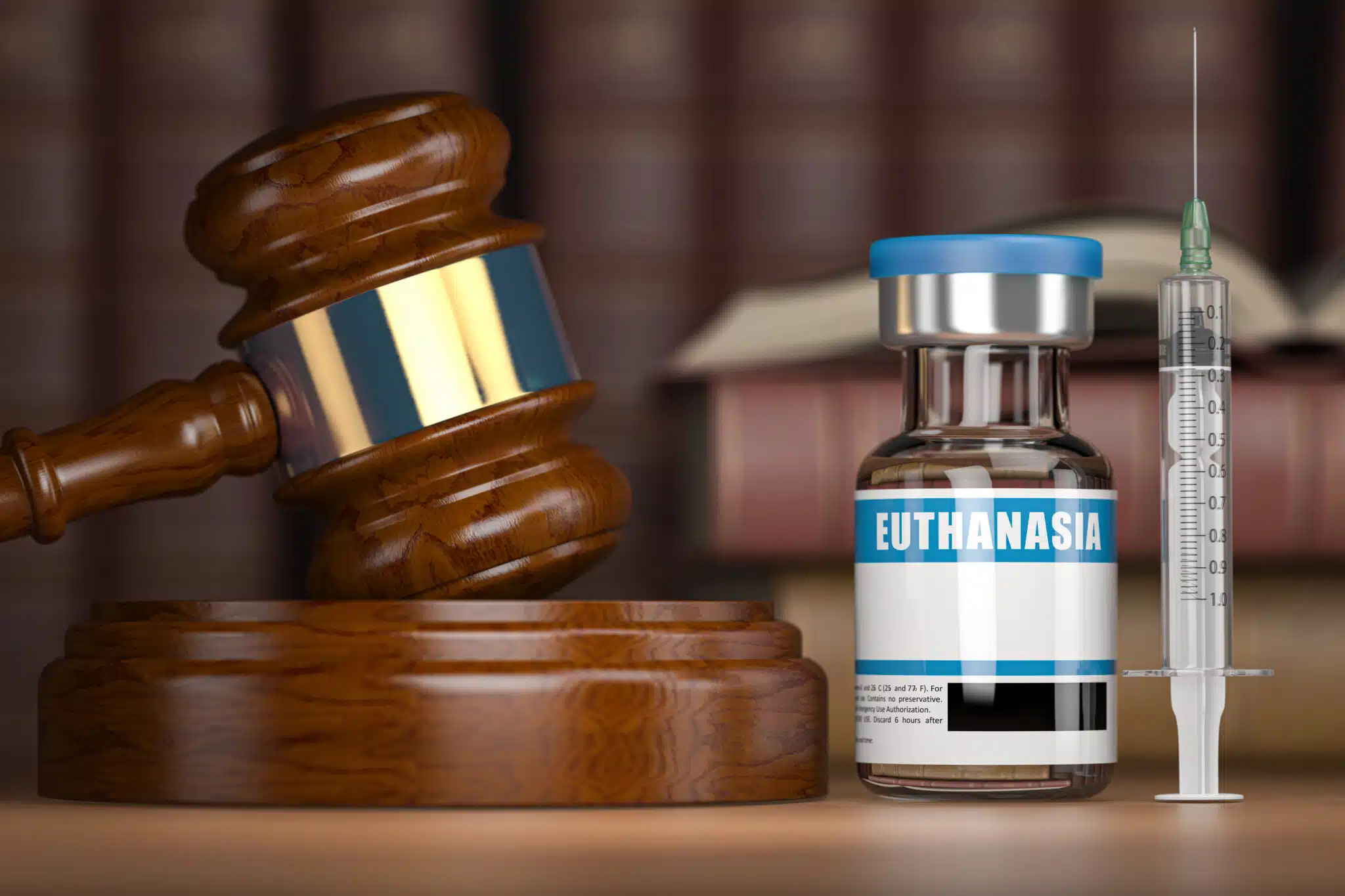
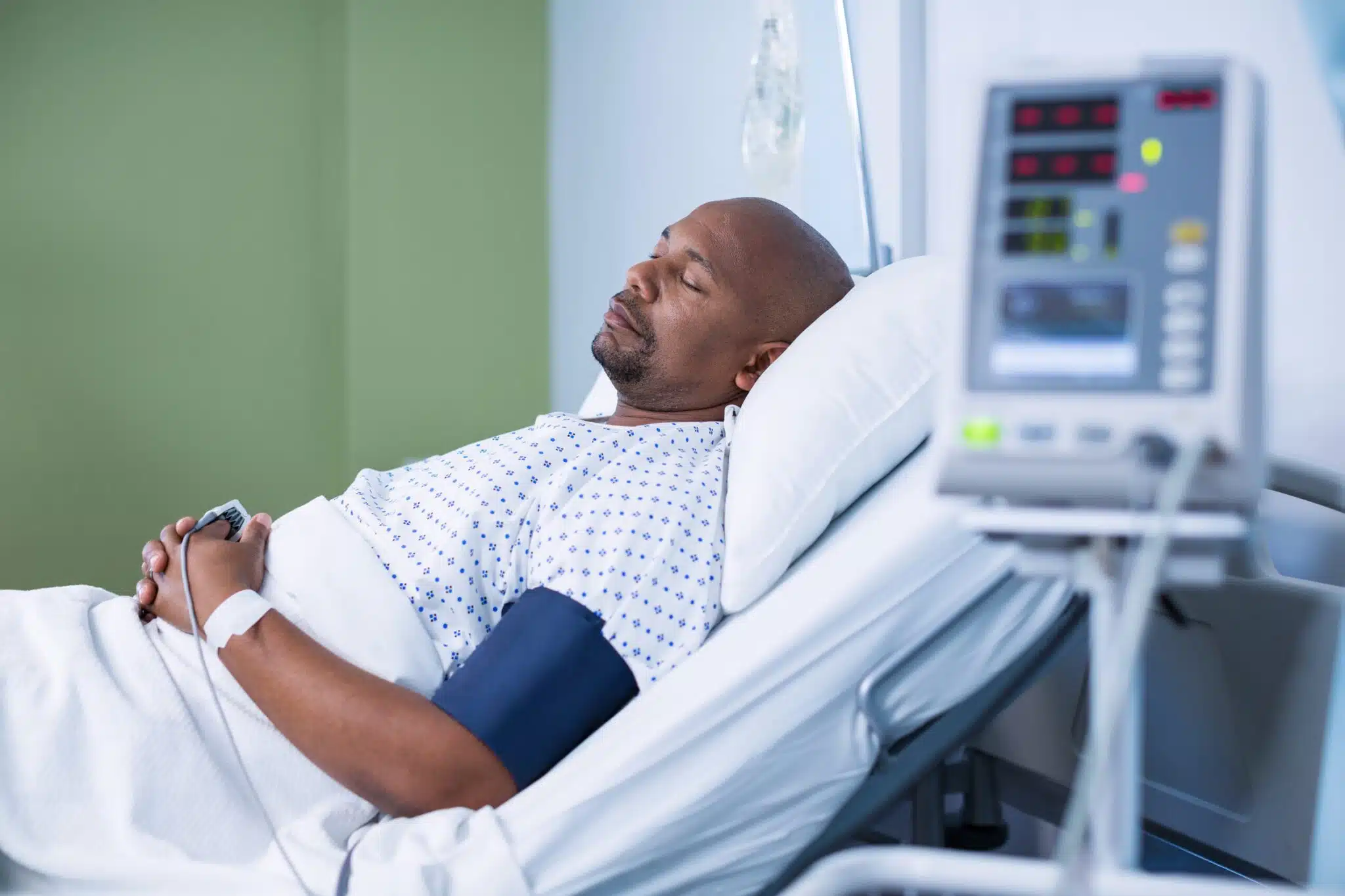

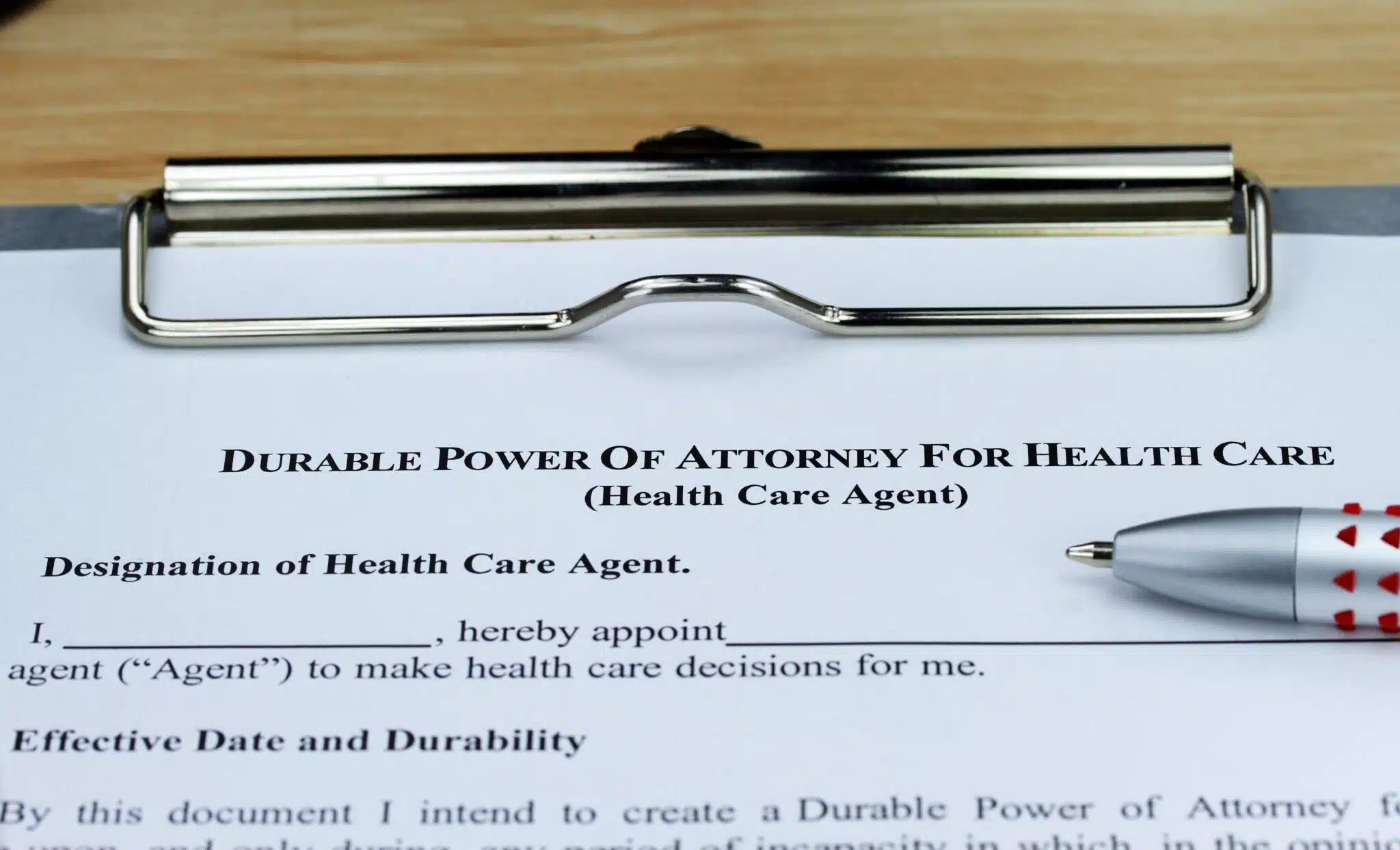
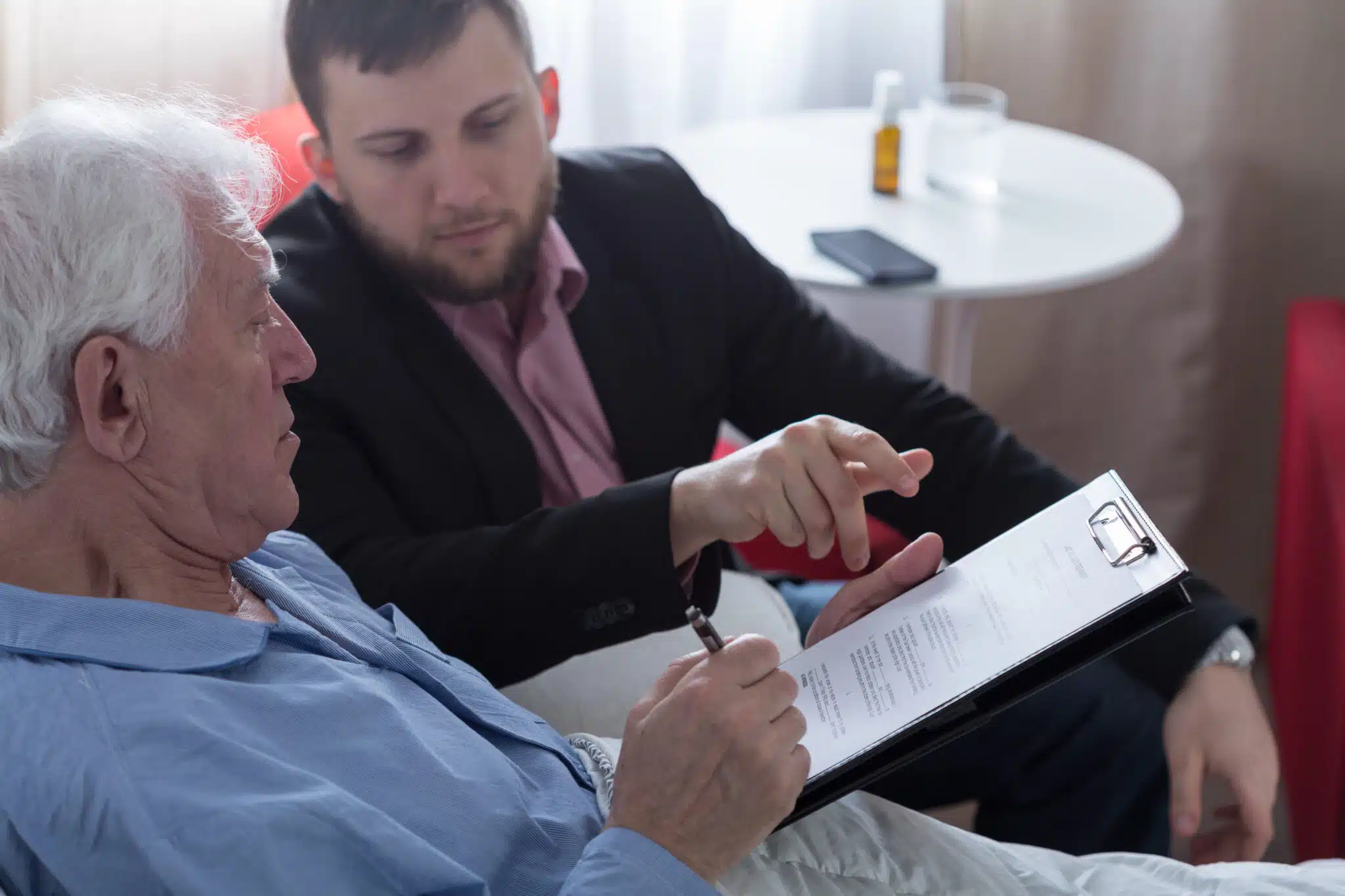
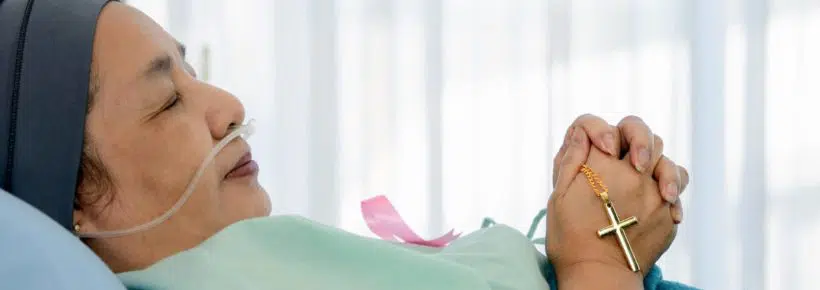

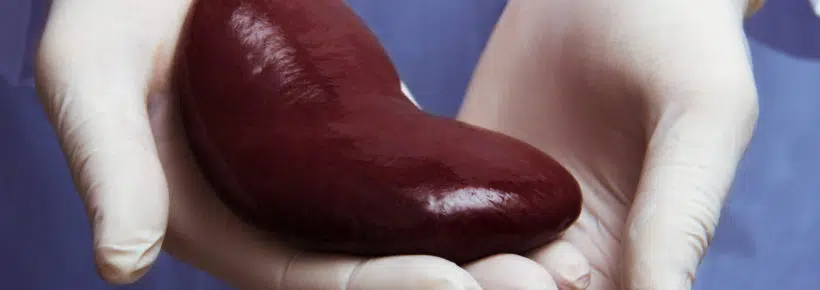
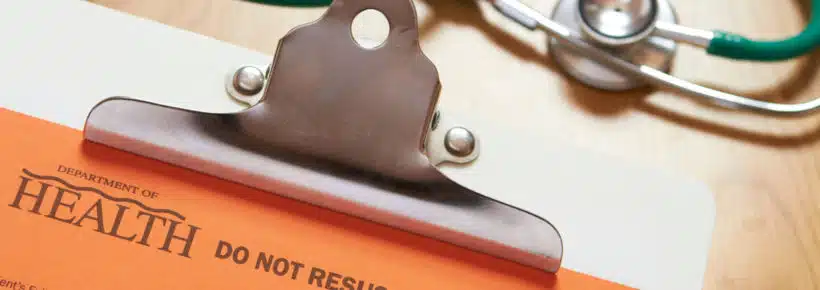


I’ve been reading on information about “pro-life POAs-durable.” My family members aren’t the best choice for me to consider them as “decision makers”. Different beliefs, and disagreements. Are there resources of “pro-life decision makers” whom I might count on as a representative. What would be the procedure to meet with someone?
Thank you.
Ann McErlean
Ann, good question, thank you. We are not aware of any pro-life group that also does this work but have a few suggestions. You could seek the advice of a medical professional or pro-life attorney who is local to you. You might also try calling Patient’s Rights Council in Steubenville, Ohio, the leading anti-euthanasia group and ask this question.
Fill out the Prolife Durable Power of Attorney according to their instructions. The one the Catholic Church is good. Give a copy to your regular doctor. Find a friend who agrees with you on your wishes and give that person Power of Attorney (PoA) as per the paperwork. You know what that is, right? The person can speak for you if you are not able to speak. Personally, I think the best thing to do if you have a terminal disease is to get your doctor to give orders to a hospice in your area. Hospice has rules about end of life care though, i.e. the most recent thing I have read is that their patients may not have a stomach tube and that they have to have a “Do Not Resuscitate Order.” Say your prayers every night that your guardian angel stays with you all the time.